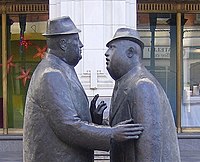
Photo from wikipedia
Abstract Aim: The aim of this study was to explore significant others’ perspectives on how information and communication technology can support the rehabilitation process after stroke and facilitate participation in… Click to show full abstract
Abstract Aim: The aim of this study was to explore significant others’ perspectives on how information and communication technology can support the rehabilitation process after stroke and facilitate participation in everyday life. Method: Thirteen significant others were included in the study, and to capture their perspectives, two focus groups, and five individual interviews were carried out in Denmark and Sweden 6-12 months after the stroke incident. A grounded theory approach was used throughout the study and a constant comparative method was used in the analysis. Results: Five subcategories were identified from the analysis of the interviews: (1) Information and communication technology providing a sense of security, (2) Information and communication technology as a social mediator, (3) Information and communication technology as a compensator for deficits, (4) Information and communication technology as a way to reach information, and (5) Information and communication technology as a possibility to supplement the rehabilitation process. From these categories, one core category emerged: The potential of information and communication technology to facilitate participation in everyday life and thereby reduce the strains that significant others experience after stroke. Conclusion: Information and communication technology has the potential to facilitate participation in everyday life after stroke. It is important, therefore, to start using information and communication technology in the rehabilitation process after stroke, to bring meaning to everyday life and to support both the stroke survivors and their significant others. IMPLICATIONS FOR REHABILITATION Integration of information and communication technology in the rehabilitation process after stroke can accommodate several of the significant others´ needs. Educating stroke survivors to use information and communication technology as part of the rehabilitation process offloads their significant others. Integration of information and communication technology in the rehabilitation process after stroke can bring new meaning in everyday life and can facilitate both independence and participation in everyday life.
Journal Title: Disability and Rehabilitation
Year Published: 2019
Link to full text (if available)
Share on Social Media: Sign Up to like & get
recommendations!